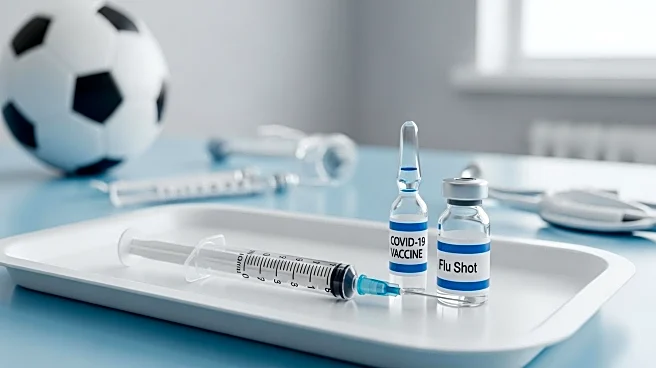What is the story about?
What's Happening?
President Trump received a COVID-19 vaccine and flu shot during his visit to Walter Reed Medical Center, as confirmed by his physician, Dr. Sean Barbabella. This visit was part of preventive health screenings in preparation for upcoming international travel. The CDC has shifted its COVID-19 vaccination recommendations, now requiring individuals to consult with healthcare providers for shared clinical decision-making. Despite this change, a prescription is not necessarily required for vaccination. Dr. Barbabella noted that President Trump's 'cardiac age' is 14 years younger than his chronological age of 79, although this claim lacks supporting evidence. The visit marked Trump's second physical examination this year, raising questions about the transparency of his health reports.
Why It's Important?
The health of President Trump, one of the oldest presidents in U.S. history, is under scrutiny, especially given recent speculation about his physical condition. The shift in CDC vaccination recommendations reflects evolving public health strategies, impacting how Americans access COVID-19 vaccines. Trump's health status, including chronic venous insufficiency, has implications for his ability to fulfill presidential duties, particularly as he prepares for international travel. The lack of detailed health data raises concerns about transparency and the adequacy of medical assessments provided to the public.
What's Next?
Further developments may include additional health disclosures from the White House, particularly as President Trump continues his demanding schedule. The CDC's new vaccination approach could lead to changes in public health policy and influence vaccination rates. Stakeholders, including healthcare providers and political analysts, may react to the implications of Trump's health status and the CDC's recommendations, potentially affecting public trust and policy decisions.
Beyond the Headlines
The use of AI-derived tools to assess President Trump's 'cardiac age' highlights the growing role of technology in healthcare. However, the lack of clinical validation for such tools raises ethical questions about their reliability and transparency. The broader implications of Trump's health, including the management of chronic conditions, may influence public perceptions of aging and leadership capabilities.
















